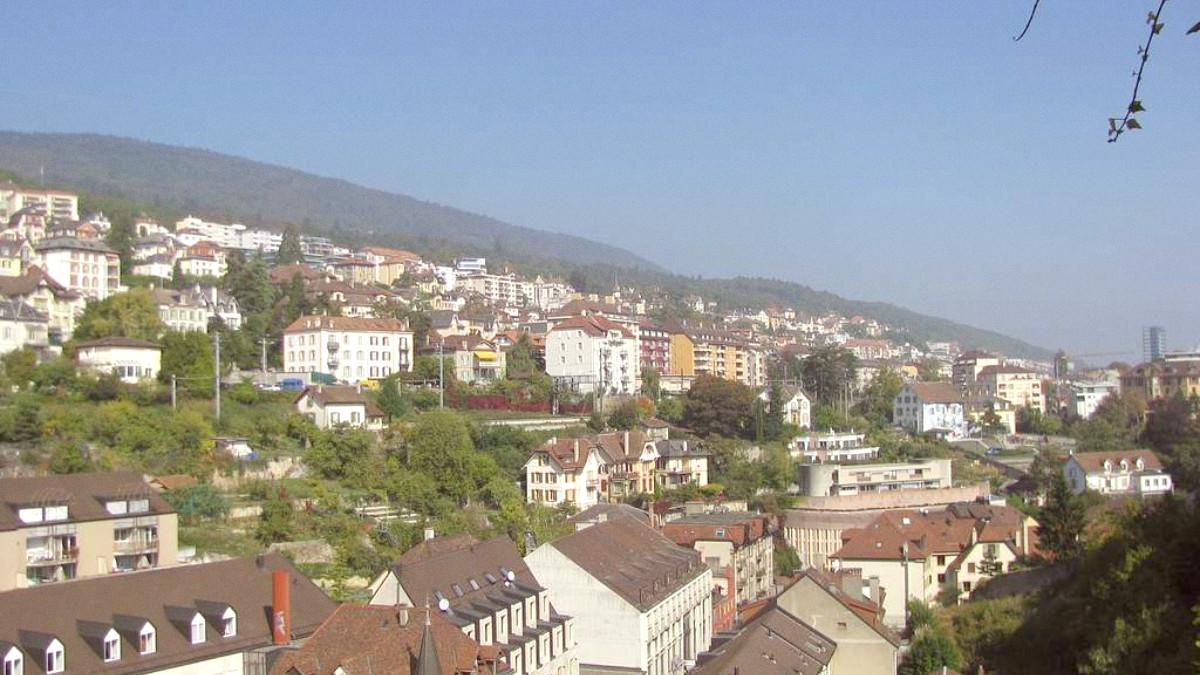
Fribourg Neuchatel And The Jura, Switzerland
Neuchâtel has a temperate climate. Summers are generally warm with temperatures 15-25°C (59-77°F). Moderate precipitation, often thunderstorms, occurs. Humidity stays moderate. Autumn sees temperatures drop, from 10-20°C (50-68°F) early on to 0-10°C (32-50°F) later. Misty conditions are common near the lake, with moderate precipitation.
Winters are cold, averaging -2-5°C (28-41°F). Snowfall happens more at higher elevations than in the city. Humidity is higher. Spring temperatures gradually rise, from 5-15°C (41-59°F). Precipitation is moderate, and weather can be variable.
Neuchâtel does not experience monsoons or hurricanes. Extreme temperatures are rare, but summer heatwaves occur. Cold snaps with heavy snowfall happen in winter, especially at higher Jura altitudes.
A common atmospheric event is "brouillard," dense fog around Lake Neuchâtel during cooler months. This fog reduces visibility but often creates an unique, mystical atmosphere. Expect sudden weather changes, especially for outdoor activities. Layers are always a good idea.
(July-August)
Warmest weather, ideal for lake activities, hiking, outdoor festivals, all attractions operating.
More tourists, higher accommodation/flight prices, crowded attractions.
(April-June & September-October)
Pleasant temperatures, fewer crowds, better prices, blooming nature, good for city exploration.
Variable weather, some reduced hours, autumn lake fog possible.
(November-March)
Lowest prices, very few tourists, winter sports in Jura, cozy indoor atmosphere.
Coldest weather, shorter daylight, some outdoor activities inaccessible, persistent lake fog.
Lake activities like swimming and boating are best in July-August. Hiking and cycling are pleasant from May-October, avoiding winter snow. Winter sports in the nearby Jura run from December-March, snow conditions dependent.
City sightseeing and cultural events find comfort in May-June and September-October. These months present agreeable weather and fewer crowds for exploring the Old Town and museums.
July-August
May-October
May-June & September-October
September-October (harvest season)
December-March
Travelers gain understanding of visa and entry rules for Switzerland. Switzerland is part of the Schengen Area, shaping requirements for many nationalities.
Citizens of EU/EFTA countries do not need a visa for stays up to 90 days. Many other nationalities, including USA, Canada, Australia, New Zealand, Japan, South Korea, and the UK, also enter visa-free for tourism or business. This permits stays of up to 90 days within any 180-day period in the Schengen Area.
Citizens of countries not on the visa-waiver list apply for a Schengen Visa (Type C) through a Swiss embassy or consulate in their home country. The process involves making an appointment, submitting forms, providing supporting documents, and paying a fee.
Currently, Switzerland has no specific health-related entry requirements, like mandatory vaccinations for general tourism. However, routine vaccinations should be current.
Switzerland has a reputation for being an expensive country.
The official currency is the Swiss Franc (CHF). Exchange rates fluctuate; check current rates before your trip. Credit cards like Visa, Mastercard, and American Express find wide acceptance in hotels, restaurants, and shops. ATMs are readily available throughout Neuchâtel for cash withdrawals.
Inform your bank of your travel plans to prevent card issues. As of late 2023/early 2024, roughly 1 CHF equals 1.05-1.10 USD or 0.95-1.00 EUR.
Expect to spend CHF 80-120 daily. This includes hostel dorm beds or budget guesthouses (CHF 30-60), grocery-based meals (CHF 20-30), public transport (CHF 5-15), and free activities.
Save by cooking, walking, and enjoying free attractions.
Luxury dining and taxis raise costs quickly.
Daily costs of CHF 150-250. This covers 3-star hotels or comfortable B&Bs (CHF 100-180), casual restaurant meals (lunch CHF 20-30, dinner CHF 30-50), public transport (CHF 10-25), and some paid attractions (CHF 20-40).
Comfortable stays and varied dining.
Frequent taxi use will add significantly to the budget.
Daily costs exceed CHF 350. This involves 4-5 star hotels (CHF 250-500+), fine dining (CHF 80-150+ per meal), taxis/private transfers (CHF 50-100+), and exclusive experiences (CHF 50-100+).
Top-tier comfort and bespoke experiences.
Costs can escalate rapidly with exclusive services.
| Category | Low End | High End |
|---|---|---|
| Accommodation (per night) | CHF 30 (hostel) | CHF 500+ (luxury hotel) |
| Meals (per person) | CHF 10 (supermarket) | CHF 150+ (fine dining) |
| Attractions | CHF 0 (free sites) | CHF 40+ (tours/cruises) |
Neuchâtel and Switzerland uphold high standards of health and safety.
Measles, Mumps, Rubella (MMR), Diphtheria, Tetanus, Pertussis (DTP), Polio, Hepatitis A and B should be current.
High altitude and clear skies increase UV exposure. Use Sunscreen, Sun hats, and Sunglasses.
Stay hydrated, especially when hiking or in warmer months. Tap water is safe to drink.
Ticks are present in wooded and grassy areas. Consider TBE vaccination if spending time outdoors. Use Insect repellent with DEET or picaridin. Check for ticks after outdoor activities.
Tap water throughout Neuchâtel and Switzerland is safe and of high quality. Carry a Reusable water bottle for refills. Food hygiene standards are very high; eating from markets and restaurants is generally safe.
No specific vaccinations are required for entry to Switzerland. Consult your healthcare provider.
Switzerland has an excellent system, though medical care is expensive. Hôpital Pourtalès is Neuchâtel's main hospital.
Easily found, offer advice for minor ailments, and dispense prescriptions.
Neuchâtel has a low crime rate and is safe for travelers. Petty crime is rare; take standard precautions.
Natural disaster risks in Neuchâtel are generally low. Seasonal hazards include potential landslides or rockfalls in mountainous areas after heavy rain or snowmelt, rare in populated zones. Localized flooding can occur during extreme rainfall.
Comprehensive travel insurance is highly recommended. Your policy should cover medical emergencies, evacuation, trip cancellation, lost luggage, and personal liability. Confirm coverage for adventure activities.
Important due to high medical costs. Pacsafe for security.
Covers unexpected trip interruptions or cancellations.
European Emergency: 112; Police: 117; Fire: 118; Ambulance: 144; REGA (Air-Rescue): 1414.